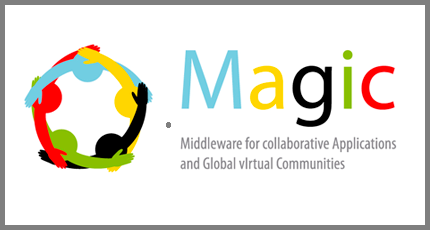
When we say MAGIC we are not talking about mysterious tricks, such as making things disappear and reappear; when we talk about MAGIC we are referring to another kind of magic, the Middleware for collaborative Applications and Global Virtual Communities project, which started its two-year term on May 1st, 2015.
Building on the success of the ELCIRA project, RedCLARA -with partners from Latin America, Europe, the Caribbean, West and Central Africa, Eastern and Southern Africa, North Africa and the Middle East, Central Asia and Asia-Pacific- is leading MAGIC, a global collaboration project which aims over the next two years to significantly improve the ability of researchers and academics around the world to collaborate together.
Specific Objective
The MAGIC Project seeks to establish a set of agreements for Europe, Latin America and other participating world regions, aimed at consolidating and completing the building blocks of middleware necessary for the establishment of a marketplace of services and real-time applications which will facilitate mobility and the work of global science communities.
Specific Objectives:
a) To foster the deployment of the platforms that enable mobility of people and seamless access to services by promoting the establishment of identity federations interconnected via eduGAIN, creating awareness of privacy and security issues and spreading eduroam by sharing experiences, carrying out training and making available shared infrastructures to ease processes in partner world regions.
b) To develop a model for interoperation between NREN cloud application markets of the participating world regions, based on cloud provisioning and taking advantage of applications developed and run by NRENs across different continents. The result will be a worldwide application market for collaboration tools and services
c) To seek consensus among participating world regions on the importance of the interoperability of real-time applications and work towards the adoption of standards such as those proposed by the Global CEO Forum to promote the creation of a worldwide environment for these applications.
d) To foster the collaborative work of Global Science Communities by actively promoting the participation of Latin American and other regions’ researchers in European Commission Calls and those of other international funding agencies with high impact in the participating regions and other networking activities.
Project members:
- (Coordinator) RedCLARA (Cooperación Latino Americana de Redes Avanzadas), Uruguay
- GÉANT, Netherlands and UK
- RNP (Rede Nacional de Ensino e Pesquisa), Brazil
- RENATA (Red Nacional de Tecnología Avanzada), Colombia
- REUNA (Red Universitaria Nacional), Chile
- CEDIA (Consorcio Ecuatoriano para el Desarrollo de Internet Avanzado), Ecuador
- CUDI (Corporación Universitaria para el Desarrollo de Internet, A.C.), Mexico
- UbuntuNet Alliance, Malawi
- WACREN (West and Central African Research and Education Network), Ghana
- ASREN (Arab States Research and Education Network), Jordan
- CESNET (Czech Education and Scientific Network), Czech Republic
- GRNET (Greek Research and Technology Network), Greece
- SURFnet, The Netherlands
- CSIR (Council for Scientific and Industrial Research), South Africa
- RENATER (Reseau National de l’Enseignement et la Recherche), France
- NIIFI (National Information Infrastructure Development Institute), Hungary
- CKLN (Caribbean Knowledge and Learning Network), Grenada
- NITC (National Information Technology Center), Kyrgyzstan
- TEIN*CC (TEIN* Cooperation Center), Korea